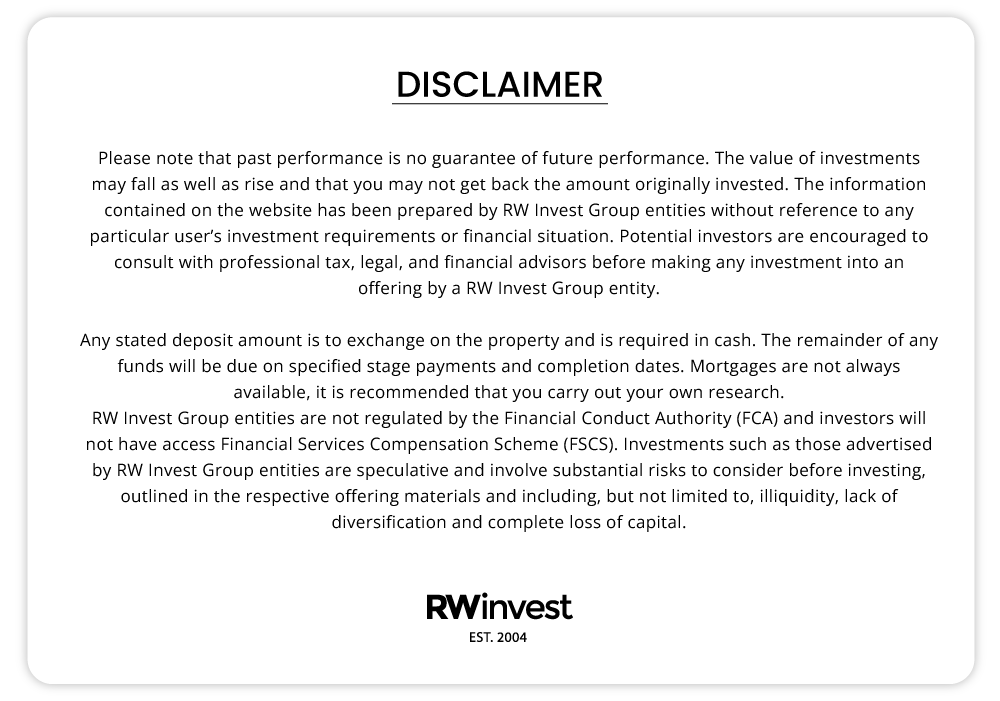- Is It a Good Time to Buy a Property Through a Limited Company?
- What Are the Benefits of Buying Property Through a Limited Company?
- What Are the Downsides of Buying Property Through a Limited Company?
- Buying a Property Through a Limited Company: Is it Right For You?
- How Do You Form a Limited Company?
- Can I Live in a Property Owned By My Limited Company?
- Learn More About Property Investment With RWinvest
Is It a Good Time to Buy a Property Through a Limited Company?
With a record number of new companies set up by buy-to-let landlords in 2023, you may think 2024 is the perfect time to buy property through a limited company.
But should you?
Here, we’ll discuss the pros and cons of buying a property through a limited company in 2024!

How to Build a Property Portfolio, Get Started Now!
Tips on how to start building your property portfolio with tools for success.
What Are the Benefits of Buying Property Through a Limited Company?
1. You Can Save Thousands When Paying Corporation Tax
Perhaps the biggest reason investors choose to form limited companies is how income is taxed in a company.
While individual investors will pay income tax, which ranges from 20 to 45%, profits held within a company are instead subject to Corporation Tax.
This is significant because Corporation Tax rates are far lower than income tax.
Corporation Tax is currently at a flat rate of 25% after increasing from 19% in April 2023.
Although these savings aren’t substantial for basic-rate taxpayers, investors in the higher tax brackets can save huge amounts of money when they pay corporation tax.
You can learn more about the taxes involved with buy-to-let by reading our guide.
2. More Mortgage Tax Relief is Available
If you’re a property investor, you’ll know one thing:
Buy-to-let mortgages can be pricey.
With regular interest payments needed each month and the fact you still need to pay tax, your rental profits can be eaten away.
Previously, UK landlords could deduct mortgage expenses from their rental income and reduce their tax bill.
But tax changes in April 2020 meant this was no longer the case, with individuals now given a tax credit based on just 20% of their monthly mortgage interest payments.
Bummer, right?
Well, not to worry, as this isn’t the case for limited companies.
Instead, limited companies can treat mortgage interest as a business expense, which means they can receive 100% tax relief against their rental property income.
3. Gifting Property Is Easier With Reduced Inheritance Tax
If you’re buying property with the end goal of providing an asset to family members, limited companies might be a practical choice for you.
This is because property held by a company gives you various opportunities to mitigate inheritance tax.
You can do this by using trust structures, shares, and other methods individual landlords don’t have access to.
If you want to form a limited company for property investment, be sure to speak to a specialist advisor to guide you through the process and see if it is right for you.
4. You Can Easily Reinvest Funds After-Tax Savings
If you’re thinking of buying a second property to rent out and want to own multiple assets, you may want to reinvest your income.
While individual landlords have to pay income tax on all profits regardless of intentions, it can work differently in a company.
This is because your profits after corporation tax can be kept within the company and directly used to reinvest, helping you avoid further tax payments.
That’s not to mention that due to the tax savings on offer, private landlords have even more money to spend on new properties.

Last Chance to Invest in Luxury Waterfront Apartments
Limited time offer! Back-to-market 1-bed units in one of our best-ever developments
What Are the Downsides of Buying Property Through a Limited Company?
1. Taking Money Out of the Company Isn’t Easy
While forming a limited company can save you a tonne through income tax, you may encounter some tricky issues when getting your income.
This is because you can’t simply pocket the cash and be done with it; you need to either receive your money as a dividend or take it as a salary.
However, both methods have some issues that you’ll need to think about:
- For the dividend solution, only the first £2,000 you take is tax-free. Above this threshold, you will start paying taxes, with a basic rate of 7.5% and a higher rate of 38.1%. You will need to pay this after the corporation tax, meaning there will be limited saving potential if your income doesn’t fall under the higher income tax rate.
- When taking money as a salary, you will need to operate PAYE and provide national insurance contributions like any other employer. While this sounds ideal, the national insurance contributions can sometimes be even pricier than the higher tax rates in the dividends route.
So, what’s the bottom line?
Although you will be saving money on taxes in some areas, you will be spending money in others. You will need to check your circumstances to see if that decision is worthwhile.
2. No Capital Gains Tax Allowance
We’ve spoken a lot about the wealth of tax advantages attached to forming a limited company, but, unfortunately, it isn’t all plain sailing.
Unlike individual investors, those with a limited company won’t access the capital gains tax allowance.
This can be a significant drawback for investors, as selling your property is often one of the most important aspects of property investment.
While it is by no means a deal-breaker, it does make an already taxed profit even smaller.
3. You Can’t Easily Put Property Into a Limited Company
If you’ve already got a property portfolio and want to put your buy-to-let property in a company, you may have a problem.
Sadly, property investors can’t simply transfer their residential property to a company.
Instead, your company will need to buy it from you (confusing, I know).
This isn’t good news, as you’ll encounter all the expected costs of buying and selling a property, including:
- Capital gains tax
- Stamp duty land tax
- Legal fees
- Early repayment charges for your mortgage
So, while you’ll be saving money from paying income tax, you’ll also encounter costs in another way.
So, is this worthwhile to do?
Well, it will depend on how many properties you already own.
If you have one or two properties, the costs may not be worth it.
For those with 10 rental properties, it may be a more tax-efficient solution due to the way tax treatment is handled with a company.
Seek professional advice if you want to discuss if this is right for you.
4. You May Have Difficulties Finding Mortgages
This is a lot less of an issue now than in years prior, but problems with mortgage availability are still something you may encounter as a limited company.
In times gone by, companies would be hard-pressed to find ideal mortgages, which were usually hard to find and came with even higher monthly costs and a lower borrowing limit.
As more and more investors opt for the limited company route, more lenders have started supplying mortgages, helping ease this once significant drawback.
You will still find fewer available mortgages than if you were an individual investor, though, and will still be subject to the same checks.
That means you will still need to give a personal guarantee and see your finances scrutinised.
5. Owning a Limited Company Can Be Time-Consuming With Additional Costs
Setting up a limited company might not be for you if you want a completely hands-off investment with little work.
Like any business, you will need to put work in to succeed.
This includes paperwork and filing annual company accounts, which can get pricey with accountancy costs.
While this is by no means a major problem, it is something you should consider when debating buying property through a company.

Unbeatable Views, Unbeatable Returns
Secure a 2-bed apartment in this landmark development boasting panoramic views of Liverpool’s Waterfront.
Buying a Property Through a Limited Company: Is it Right For You?
Setting up a limited company to buy property can be a good idea for many investors.
But is it right for you?
You should ask yourself the questions below to see if buying property through a business is the best idea in 2024.
How Much Income Will You Earn?
One of the first things you will need to consider is the amount of income you will expect to earn, including property and other sources.
If your income falls into the higher income tax brackets of 40-45%, it may be worthwhile opting to form a limited company to take advantage of the lower Corporation Tax rates.
Do You Already Own Property?
If you already own property, it may not be worth transferring ownership to a new company due to fees.
However, if you have several properties in your property portfolio, it will likely be worthwhile forming a limited company to save money in the long run.
Do You Need to Use a Mortgage?
If you’re going to rely on mortgages to buy your properties, it’s worth considering forming a company.
This is because the ability to claim 100% of your mortgage interests against your rental income as an operating expense will save you plenty of cash.

Get Your FREE Liverpool Investment Guide
Everything you need to know about investing in Liverpool, one of the UK’s hottest investment cities.
How Do You Form a Limited Company?
According to the official government website, you can form a limited company in seven steps.
These are:
- Check if setting up a limited company is right for you
- Choose a name
- Choose directors and a company secretary
- Decide who the shareholders or guarantors are
- Prepare documents agreeing on how to run your company
- Check what records you’ll need to keep
- Register your company
Do Limited Companies Pay Stamp Duty on Property?
Your company will pay the same stamp duty rates as individual property investors. This includes the base fees plus the additional 3% second home surcharge.

Liverpool's Biggest, Boldest Development!
Last chance to invest! Earn up to £28k Annually with 6% assured yields.
Can I Live in a Property Owned By My Limited Company?
If you have a buy-to-let mortgage, you cannot live in the property.
Should I Buy My First Property Through a Limited Company?
This depends on your circumstances and investment goals.
If you only intend to own a few properties, it may not be worth forming a company.
However, higher-rate taxpayers and those intending to own multiple properties could save thousands on taxes with a company.
You should consider your costs and decide if the tax savings on offer will be worthwhile.




